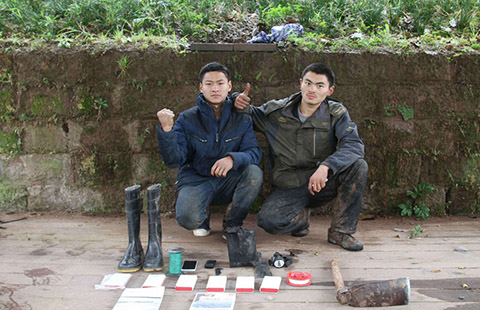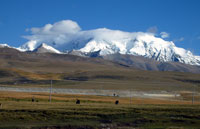Invasion anniversary marked amid anti-Japan protests
(Xinhua) Updated: 2012-09-18 22:00SHENYANG/BEIJING - New waves of anti-Japan protests erupted in Chinese cities as citizens commemorated the 81st anniversary of the Japanese invasion of northeast China and mourned the war dead on Tuesday.
"What happened here 81 years ago was painful and unforgettable for every Chinese person," said a man who gave his surname as Zhang, in Dalian, a port city in northeast Liaoning Province. "We have to be on alert, given the recent provocations by the Japanese government over the Diaoyu Islands."
On Sept 18, 1931, Japanese troops blew up a section of the railway under its control near Shenyang, then accused Chinese troops of sabotage as a pretext for war. They then bombarded the barracks of the Chinese troops near Shenyang the same evening, starting a large-scale armed invasion of northeast China.
Four months later, Japanese troops occupied 1.28 million kilometers of Chinese territory in northeast China, an area 3.5 times the land mass of Japan.
The incident was followed by Japan's full-scale invasion of China and the rest of Asia, and triggered the 14-year War of Resistance Against Japanese Aggression.
In the southern Chinese city of Shenzhen, hundreds of protestors expressed their strong opposition to the Japanese government's so-called "purchase" of the Diaoyu Islands near the city's Japanese consulate general, shouting, "All Chinese unite" and "Japanese militarism must surrender."
In central China's Henan province, more than 1,000 people joined anti-Japan demonstrations in the provincial capital Zhengzhou. Some waved national flags and banners, shouting "Don't forget national humiliation," "Safeguard the Diaoyu Islands," and "Defend national sovereignty."
In north China's Inner Mongolia Autonomous Region, about 10,000 people joined demonstrations in Hohhot and Baotou. "We want to clearly tell the world our stance. We want to announce that the Diaoyu Islands belong to China and nothing can stop us from defending our sovereignty," a young man leading the group shouted.
Chinese authorities have called on the public to refrain from violence and express their patriotism in a rational and peaceful manner.
Major Shanghai-based universities held patriotic activities, encouraging students to express their love for their country in a rational manner.
"The image of college students is part of the country's. We should channel our emotions into rational displays of patriotism and avoid hurting ordinary people," said Liang Jianhui, a student at Shanghai Normal University.
Police departments in many cities have used their official microblogs to call for rational and peaceful expressions of patriotism, asking citizens to provide photographs, video clips and other evidence to help police catch those who have acted illegally or irrationally during the demonstrations.
Police in Guangzhou on Monday detained 11 people who allegedly smashed a Japanese-brand car, shop windows and billboards during protests on Sunday.
A Finnish national who lives near the Japanese Embassy in Beijing witnessed the demonstrations over the past few days, saying the largest group of demonstrators assembled Tuesday and they were mostly orderly, except for some people who hurled water bottles at the embassy.
"People are free to express their ideas, whatever problems they have. I think the problem mainly stems from historical factors," Sergi Vicente, a journalist with Catalonian Television of Spain, said at the site of the protest.
On Tuesday, Japanese-invested businesses, including garment retailer UNIQLO, Ito Yokado Department Store and 7-Eleven convenience stores, reportedly closed some outlets in Beijing.
One 7-Eleven branch near Beijing's Third Ring Road hung out a Chinese national flag and covered the store's logo with a piece of paper. A notice posted on the door said the shop closed due to a "power outage."
At one Beijing outlet of Yoshinoya, a popular Japanese-style fast food chain, a notice had been posted claiming that the company is "100-percent Hong Kong-invested."
In Suzhou High-tech Zone in East China's Jiangsu province, where around 500 Japanese enterprises are located, Japanese stores, bars and restaurants also closed.
Some 22,000 workers from at least three Chinese factories of leading camera maker Canon Inc. were granted a two-day holiday on Monday and Tuesday after production was halted.
Hu Jiaji, the Labor Union Chairman of Panasonic Semiconductor (Suzhou) Co., Ltd., confirmed that the company's electronic engineering department was temporarily closed.
Hu said workers had voiced anger over the Diaoyu Islands, but had not taken further action.
- 81st invasion anniversary remembered across China
- Demonstration in HK marks invasion anniversary
- Patriotic activities mark invasion anniversary
- China issues thematic map on Diaoyu Islands
- Japan urged to return to negotiations
- Fitch: Island dispute could hit Japan tech, auto
- Japanese restaurants caught in anti-Japan protests
- Japan, US agree on second missile deal
- Move to curb violence in anti-Japan protests
- There should be no provocation over Diaoyu Islands
- Famous names join Diaoyu Islands protest
- Shenzhen eyes land reclamation to curb rising housing price
- Eight issues in spotlight at the two sessions
- Suggestions pledged on reform and efficiency
- The project that opened a window to the world
- New faces at National People's Congress
- Digging deep to explore subterranean space
- 110 Long March rockets to be launched in 5 years: scientist
- Mobile HIV testing labs to hit streets in capital
- Veteran journalist named new spokesman of China's top meeting of political advisors
- Elder care seen as a key concern in a graying nation







